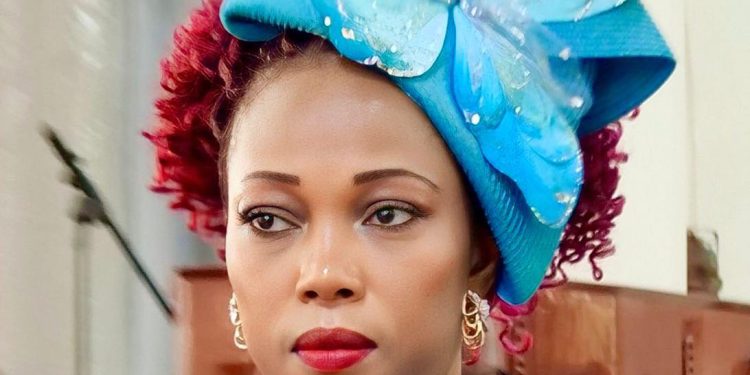By Hassan Osman Kargbo
A wave of public debate has erupted across Sierra Leone following the conduct of the First Lady, Her Excellency Dr. Fatima Maada Bio, during the recent State Opening of Parliament. The controversy stems from her decision not to stand when President Julius Maada Bio and Vice President Dr. Mohamed Juldeh Jalloh entered the well of Parliament — a moment traditionally marked by all present rising to show respect to the nation’s highest offices.
Eyewitnesses reported that while parliamentarians, dignitaries, and guests stood to welcome the President, the First Lady remained seated. The incident drew immediate attention from those in attendance and has since triggered widespread discussion on social media, radio talk shows, and in public gatherings, leading citizens to ask if the first Lady is above the law as she failed to stand when all else stood up to honour the President.
What has further fuelled the debate is the claim that the First Lady appeared disengaged during the President’s address, reportedly using an earphone while the President was delivering his speech to the nation. Many citizens have interpreted this as a sign of disregard, not just for the office of the President but for the formal setting of Parliament and the people of Sierra Leone.
Reactions from members of the public have been sharp, and in many cases, critical. For some, the First Lady’s conduct is seen as a breach of expected decorum, while for others it raises questions about whether certain individuals are considered above the norms and traditions that bind citizens.
“This is not just about politics — it’s about respect,” said Mariama Conteh, a market trader at Shell new road. “When the President enters, everybody stands. It’s a sign that we value our institutions. If the First Lady can’t do that, what example is she setting?”
Civil society voices have also weighed in. “The First Lady holds no constitutional office that exempts her from basic parliamentary etiquette,” remarked political analyst Abdul Karim Sankoh. “Her refusal to stand undermines the spirit of national unity that such ceremonial events are meant to promote.”
Others expressed frustration over what they see as double standard. “If it were an ordinary citizen who failed to stand or showed such behaviour in Parliament, the outrage would be swift and possibly followed by sanctions,” commented Ibrahim Kamara, a university student. “Why should anyone be above these simple gestures of respect?”
Furthermore, standing for the President is considered a symbolic but deeply significant act during parliamentary proceedings. It is not just about honouring the person in office, but about respecting the Presidency as an institution representing the sovereignty of the nation.
Parliamentary protocol experts note that while the First Lady is not an elected official, her position in the public eye comes with a certain expectation of conduct, especially at high-profile state functions. The moment has therefore struck a chord with citizens who see the action — or in this case, inaction from the First Lady.
Also, the incident has inevitably sparked political commentary, with some interpreting it as a personal statement, while others warn against reading too much into one event. However, the perception that the First Lady appeared distracted and disengaged while the President addressed Parliament has fuelled speculation about internal dynamics and the image of the Presidency.
For supporters of the ruling party, the controversy is an unwelcome distraction at a time when government is keen to project stability and unity. For critics, it serves as a potent symbol of what they perceive to be a growing culture of disregard for established norms among the country’s political elite.
Social media platforms have been flooded with posts and videos from the event, with many calling for the First Lady to address the matter publicly. While some of her defenders argue that there may have been personal or health reasons behind her actions, no official explanation has been issued from the Office of the First Lady at the time of writing.
As public discussion intensifies, many Sierra Leoneans say the matter is not about personal animosity towards the First Lady, but about preserving the values and traditions that uphold respect for the highest offices in the land.
“Respect for the Presidency should be universal, regardless of your position or relationship to the person holding that office,” said retired civil servant Patrick Davies. “We can’t pick and choose when to honour our institutions — it’s a duty for all of us.”
The episode has left many awaiting a response or clarification from the First Lady. Whether or not such a statement comes, the debate it has triggered is likely to continue, reflecting deeper public concerns about leadership, symbolism, and respect for national institutions.













